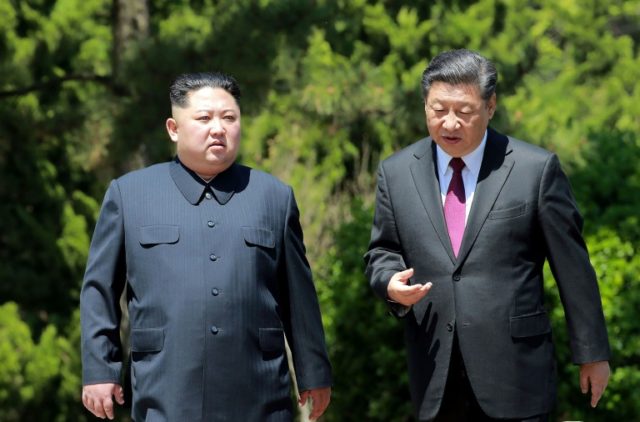Soon after President Donald Trump concluded his Tuesday summit with North Korean dictator Kim Jong-un, Chinese media predicted a new golden age of prosperity for Pyongyang and urged it to join China’s massive “Belt and Road” infrastructure project.
China’s state-run Global Times found a new spirit of “business optimism” sweeping North Korea after the summit, while Chinese businessmen took to social media to eagerly anticipate the resumption of commerce blocked when China joined tough international sanctions against Kim Jong-un’s nuclear missile program.
The Global Times approvingly cited President Trump’s musings about the potential value of North Korea real estate to China, saying, “You have South Korea, you have China, and they [North Korea] own the land in the middle. How bad is that, right? It’s great.”
The article included a few dashes of cold water from experts who cautioned that it will take years for North Korea to open its economy after sanctions. Pyongyang’s oppressive laws, inscrutable political system, and suffocating regulatory environment were cited as obstacles. Given that China’s tightly controlled media delivered this critique, it can probably be interpreted as a list of things Beijing expects Pyongyang to address promptly before Chinese money and capital can flow into post-sanctions North Korea.
The other thing North Korea desperately needs is better infrastructure, a point reinforced by another Global Times piece on Wednesday that urged North Korea to join the Belt and Road initiative to “rebuild its economy and promote regional economic integration.”
The Global Times envisioned a major role for South Korea in North Korean development but stressed that North Korea’s renaissance should be focused on plugging it into Belt and Road, which would also give the Chinese project a chance of assimilating South Korea as well:
The country shares borders with both China and South Korea, the latter of which is an important country along the B&R initiative. North Korea’s significant geographical location is likely to offer convenience when involving the isolated country into the trade routes of the region. After US President Donald Trump and North Korean leader Kim Jong-un signed a document on Tuesday, the world should begin to consider loosening economic sanctions against North Korea in a bid to inject more momentum into political dialogue. Instead of putting pressure on Pyongyang by imposing financial sanctions, the focus should now gradually shift to economic assistance, at a time when Pyongyang is changing its attitude toward nuclear tests and giving priority to economic development.
South Korea is an appropriate partner to offer economic assistance, and signs have shown that Seoul is ready to move. During the historic summit between Kim Jong-un and South Korean President Moon Jae-in, the latter reportedly handed Kim Jong-un a USB flash drive containing economic development plans, including electric power infrastructure, railways and highways that could be built if Pyongyang works toward denuclearization of the Korean peninsula. Although infrastructure in North Korea has steadily improved since the 1950s, the need for the refurbishment of those facilities and the building of an infrastructure network connecting the isolated country with South Korea and other countries will create a yawning funding gap. The B&R initiative is probably a good chance for East Asia to push forward the integration of economic and social development by involving North Korea in its economic network.
The Global Times articles make a strong case for China being much better positioned to take advantage of North Korea’s prospective economic opening than the United States and its allies. Obviously, China has the geographic advantage of bordering on North Korea (as does Russia, which also wants to plug into the Korean peninsula’s infrastructure network).
Beijing’s other big advantage is that Chinese investors can be much more confident that their investments will be shielded against North Korean corruption and ideological lunacy. There are plenty of South Korean, Japanese, European, and American firms who would like a shot at developing North Korea’s huge mineral resources and profiting from a flourishing post-sanctions marketplace, but they will be justifiably cautious about putting big money into one of the most deranged political systems in human history.
Foreign investors have a long and gloomy history of losing big money after North Korea’s psychotic government seized their assets or shut down facilities they spent millions to develop. China will have more muscle to protect its investors, especially if it weaves the tentacles of “Belt and Road” deep into North Korean infrastructure.
An analysis at CNN Money on Tuesday added that North Korea is much more likely to welcome Chinese investment due to lingering paranoia and ideological hostility to all other potential economic partners. The regime will surely consider the risk of ideological contamination from Chinese commerce to be much lower than allowing capitalist businessmen and skilled workers into North Korea.
It remains to be seen if Kim Jong-un knows enough to be wary of the strings that come attached to “Belt and Road” money. As Peter Ward of Seoul National University put it to CNN, “North Korea may be highly reluctant to potentially allow China to forcibly take possession of future ‘distressed assets.’” China, on the other hand, can’t wait to plant “Belt and Road” seeds all over North Korea and harvest enormous influence over the cloistered North Korean marketplace when its assets become distressed.

COMMENTS
Please let us know if you're having issues with commenting.